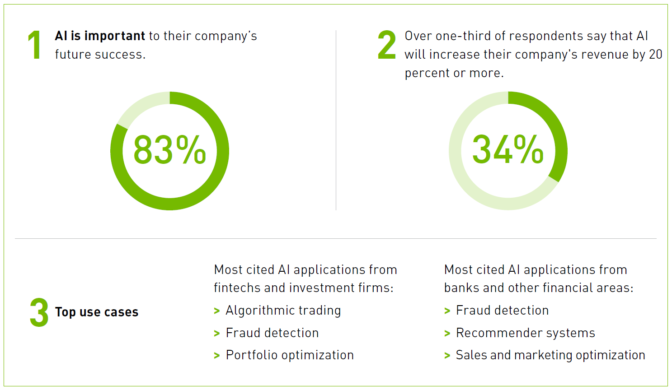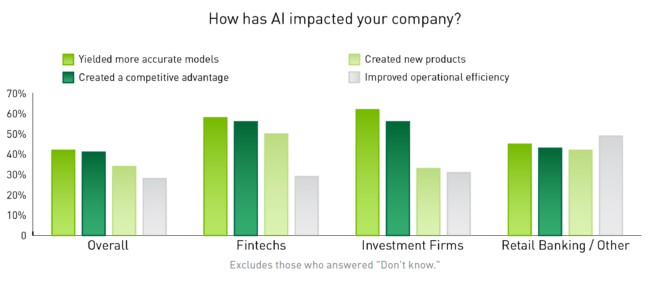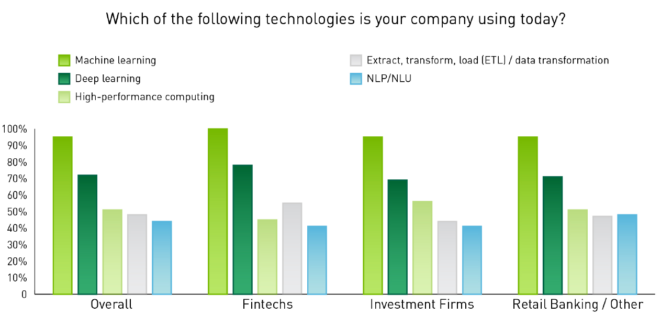Financial services companies are challenged with defining and executing their AI strategy.
AI solutions contribute to both the top and bottom line for firms by powering nearly every function, including customer service, cybersecurity, new account acquisition and regulatory compliance.
Everyone from executives to data scientists are involved with determining how much to invest, the most profitable use cases to pursue and the biggest challenges that must be overcome in 2021 and beyond.
These are some of the findings of NVIDIA’s recent survey of over 200 financial services professionals from around the world. To fill in a more complete picture of how financial services institutions are using AI, and where it’s headed, our “State of AI in Financial Services” survey consisted of questions covering a range of AI topics, such as deployment models, infrastructure spending, top use cases and biggest challenges. Respondents included C-suite leaders, managers, developers and IT architects from fintechs, investment firms and retail banks.
Getting a Pulse on AI in Financial Services
The survey results showed two consistent themes: AI provides a competitive advantage in financial services, and banks plan to invest significantly in AI infrastructure to unlock its full potential.
Among different roles and subsectors within the industry, the survey data showed finer differences in how AI can best be deployed and the specific challenges for business decision makers and technical implementers.
Three highlights stood out among the survey results:
AI-Enabled Services Grow Revenue and Cut Costs
Our respondents were in widespread agreement on the value of enterprise AI, as 83 percent agreed with the statement that “AI is important to my company’s future success.”
The survey results showed how financial services firms view AI as an enabler of growth opportunities. Over half of those surveyed who had an opinion stated AI will increase their company’s annual revenue by 10 percent or more. In contrast, only 12 percent of respondents — excluding those who marked “Don’t Know” — stated that AI is having no impact on their revenue growth.
AI can also improve the bottom line of financial services institutions through cost savings. For instance, banks, insurers and asset managers are creating significant efficiencies in their daily operations using technologies such as conversational AI, robotic process automation, optical character recognition and other machine learning and deep learning applications.
These AI services save time and reduce expenditures by automating insurance claims processing, augmenting call center agents via automated speech recognition for call transcription and carrying out other manually intensive services.
Passing AI Benefits to Customers
Survey respondents said the top three areas where AI affected their companies were yielding more accurate models (42 percent), creating a competitive advantage (41 percent) and building new products (34 percent).
Utilizing AI to create more accurate models means better outcomes for banks and their customers, particularly in protecting against fraud and maximizing investment returns. These benefits translate into competitive advantage that often leads to increased market share and greater shareholder value. New products from AI enable cross-sell opportunities through enhanced personalization, which generates higher customer retention.
Challenges to Achieving AI Goals
While the benefits of leveraging AI in financial services are unmistakable, the journey from research to enterprise-scale production for AI models within banks, insurers and asset managers is marked with potential pitfalls and challenges.
Our survey identified those barriers, starting with the biggest challenges to achieving a company’s AI goals. The top three cited by respondents were too few data scientists (38 percent), insufficient technology infrastructure (35 percent) and a lack of data (35 percent).
The C-suite is looking to overcome these challenges by building AI expertise across the enterprise. 60 percent of C-level executives responded that their largest focus moving forward is identifying additional AI use cases. One in two respondents from the C-suite noted that their company also plans to hire more AI experts — addressing the gap of too few data scientists.
These findings warrant further exploration, especially in the context of new AI frameworks and platforms for smarter banking.
Popular AI Use Cases for Financial Services
Survey respondents from fintechs and investment firms highlighted portfolio optimization and algorithmic trading as the top AI use cases their companies currently invest in. This data can be understood in the context of maximizing client returns on investment.
Respondents from commercial and retail banks, on the other hand, noted that their companies are mainly investing in AI for fraud detection through payments, transactions and anti-money laundering. These survey results reflect a primary focus on protecting sensitive financial data for their customers.
Powering the Future of Banking with Enterprise AI
With these top use cases for AI in financial services, and dozens if not hundreds more available to banks, insurers and asset managers, the industry is understandably looking to grow its investment in AI. Sixty-two percent of our survey respondents — excluding those who marked “Don’t Know” — agreed that their company should spend more on AI applications.
Financial services professionals not only see the potential in AI, but are willing to invest more to deliver on its promise. That potential is actively being realized by companies who see AI generating competitive advantage, creating new products, adding significant revenues to the top line, and reducing costs to grow the bottom line.
As new use cases are identified and AI becomes more pervasive across organizations, the next challenge for C-suite and IT leadership will be creating enterprise-level AI platforms that deliver the productivity, scalability and return on investment necessary to support the variety of AI teams across their companies.
And, instead of starting from scratch, data scientists building models for a variety of use cases can utilize containers from NGC, NVIDIA’s hub of GPU-optimized software. These include NVIDIA Jarvis for automated speech recognition and speech to text for call center transcription to NVIDIA Merlin for recommendation system application frameworks.
To learn more about AI in the future of finance, download the survey report for more in-depth results.
And join GTC 2021 for free to hear from industry experts at Citibank, Morgan Stanley, Munich Re, Scotiabank, Wells Fargo and other leading financial institutions.
The post Is AI Important to Financial Services’ Future? New Survey Says You Can Bank on It appeared first on The Official NVIDIA Blog.



